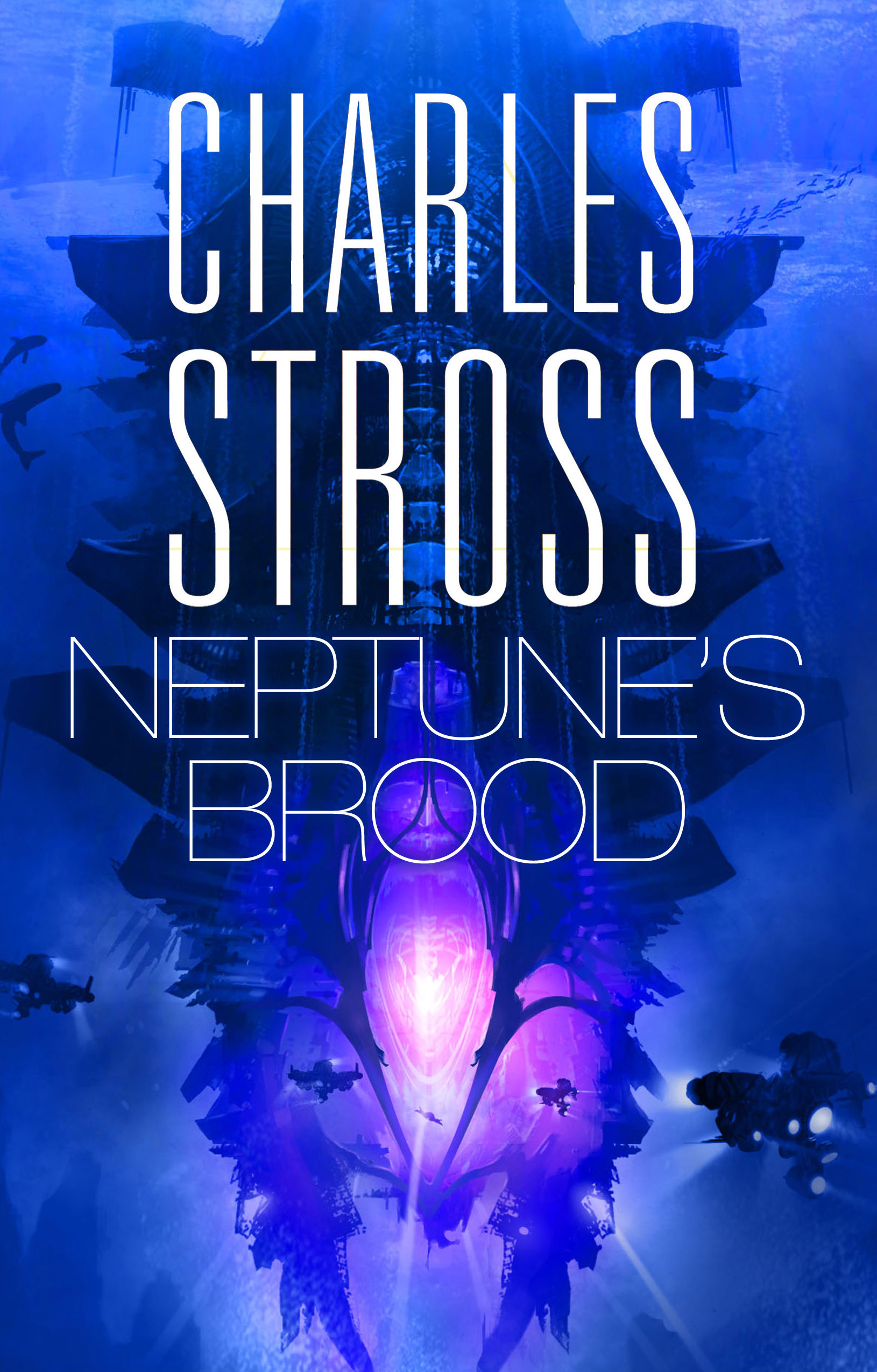This is a bit of an expanded version of my review/Hugo Appreciation Post for Charlie Stross's Neptune's Brood,which originally appeared on Tor.com on July 17, 2014.
Charles Stross is a mainstay on genre award ballots every year; 2014 marks his seventh appearance on the short list for the Hugo Award for Best Novel. There’s good reason for these accolades because when it comes to plausible and well-thought out future scenarios, few can invent better scenarios than Stross. Neptune’s Brood, in this case, imagines a post-human, far future where we as humanity have become a thing of the past often referred to as Fragiles. The novel is many things, but a primary thrust is economics in the future and a supposed defrauding scam as it features Krina Alizond-118 on her journeys through the galaxy.
.jpg) |
The first novel set in the far
future of Neptune's Brood
|
*Different characters and further in the future than Saturn's Children. but Neptune's Brood easily stands on its own.
The novel focuses primarily on Krina Alizond-118 as she searches for her missing “sister” Ana Graulle-90 (which in this sense indicates they are cloned from the same being). Krina, with her deep knowledge of the history of accounting and banking, manages to get passage on a space vessel after being convinced to offer her services as a banker. It isn’t long before Krina becomes involved with interstellar pirate bankers, learns more about her sister, and receives body modification to become a mermaid on the water world of Shin-Tethys to find her missing or perhaps dead sister. On top of all of that, Krin tells us, in her first person narrative, she has a stalker and discovers what amounts to a 2,000-year old money laundering scam which hinges on an object which might be in the possession of her sister. So yeah, lots of stuff going on here.
For my tastes; however, I didn’t fully connect with a lot of the story. There were multiple info-dumps throughout the story, many of which begin with Krina stating that she was going to tell us a story. In one such instance Krina even says “I am now going to bore you to death with the political economy of Shin-Tethys.” I realize there’s a heavy dose of snark in that statement, but t it still niggles at me that a character would tell us she is going to bore us to death and is almost an invitation to skip ahead. A lot of the info-dumps relay the minutia of the future banking system (slow, medium, and fast money) and how Krina is able to circumvent the system as well as the two-thousand year old FTL-scam which brings Krina more focused on finding her sister. While the concept is quite intriguing, at times I felt lectured at and that I was reading an academic piece rather than a piece of fiction. All of that having been said, in the end, I can see why the novel would work for so many people, while realizing it didn’t fully work for me. But this is only half the discussion since…
In terms of its worthiness/chances on winning the Hugo Award for best novel, Neptune’s Brood does indeed seem like the type of novel that should be at least short-listed. Aside from the fact that Stross is the author and seems to appear on these lists regularly, the novel takes a rather unexplored concept – economics, and couches the discussion of that concept in a (relatively) familiar setting for Science Fiction – that of the far future while also checking off the post-human, body-modification, and adventure boxes in the novel. From a superficial level, then, Stross strikes a good balance between new approach and familiar elements.

So where does this rank against the other Hugo nominees? It is hard to argue against Ancillary Justice winning because the book has won nearly every award for which it was short-listed. The Wheel of Time is also hard to ignore as a nominee considering the size of its fan base, but it is difficult to know how much of those fans will be casting final ballots. Parasite by Mira Grant marks her fourth consecutive nomination. I haven’t (yet) read the book, but seems to hit the same spot as it did for readers of her entertaining Newsflesh trilogy, so seeing her name here is not much of a surprise. This, at last, brings us to Larry Correia’s Warbound, the third book in his Grimnoir Chronicles, again, one I haven’t read though I have enjoyed the Monster Hunter books he’s written. Larry clearly has his fans, too.
That said and simply judging Neptune’s Brood against its competitors, I’ve got to think Stross will eventually receive the award for Best Novel. Though Neptune’s Brood has received the same kind of praise previous works by Stross have, I’m not sure this is Charlie’s year considering his competition. On the other hand, this convention is as close to his own backyard for Stross so there may be some support from potentially local attendees to push Neptune’s Brood to the top.

No comments:
Post a Comment